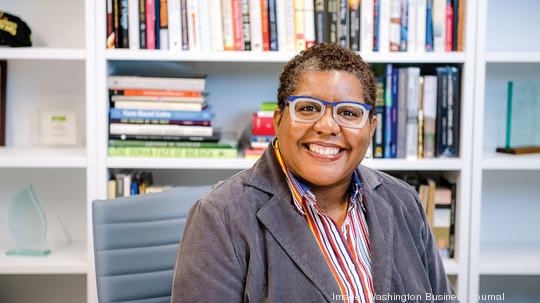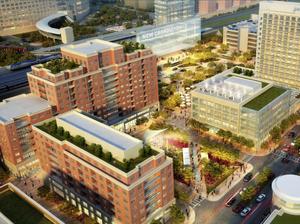
Amazon.com Inc.’s strategy for solving infrastructure challenges in communities where the tech giant is ramping up its expansion centers on one key approach: transit-oriented development.
To do so, Amazon (NASDAQ: AMZN) executives said during the American City Business Journal's "The Amazon Opportunity" event held Tuesday that the company intends to keep concentrating its investments on gaps that transit agencies and housing developers often struggle to cover, either from the company’s own pockets or through lobbying for more state and federal infrastructure aid.
The key to that has been public-private partnerships, a lesson Amazon has learned over the years of growing its Seattle presence, said Guy Palumbo, Amazon's director of public policy for Washington state. And those partnerships, he said, need to be formed quickly and early.
“We have to get ahead of it,” he said. "Traditionally, in most cities, infrastructure is a reactive thing. Growth happens and then you react to it. And that's just not good enough anymore."
The company, which has shared a sometimes contentious relationship with the Seattle City Council — culminating in a new city payroll tax that took effect this year on companies with at least $7 million in annual payroll expenses — has since announced plans to add 25,000 new jobs in nearby Bellevue, Washington, in the coming years.
Palumbo said the company recently partnered with the Bellevue Chamber of Commerce and its city manager to align their state lobbying goals, particularly around transportation, keeping employee commutes in mind. He said Amazon executives had more than 50 meetings with state legislators in Olympia, resulting in upward of $230 million in funding for transportation projects to accommodate tech growth. And now, the company is employing the same strategy with its federal delegations to lobby for the infrastructure plan now on the table in what's become a key point of advocacy for the tech giant.
The company has also focused its advocacy toward ordinances that allow for upselling around transit-oriented developments, as well as lowered parking requirements and more development incentives, Palumbo said. Its own campuses in Arlington, Bellevue and Nashville have rolled out new commuter benefits that lean harder on biking, walking and taking transit to work.
The idea? “Get people out of cars by putting jobs and housing directly on transit sites,” Palumbo said.
To that end, Amazon's Housing Equity Fund, a $2 billion pot of money established in January to support 20,000 affordable homes in the three headquarters regions, is also targeting construction or preservation projects near mass transit. In June, it announced commitments of millions of dollars in all three markets to support affordable housing development on transit agency-owned land, partnering with the likes of the Washington Metropolitan Area Transit Authority here and Sound Transit in Seattle. The goal is to cut transportation costs for families, avoid pushing affordable housing further away from the city core and cut back on carbon emissions, according to Catherine Buell, Amazon’s senior manager of community development who oversees the housing fund.
“We know those transit agencies don’t have the funding to be able to advance projects,” Buell said. "Each of the transit agencies we’re partnering with have a long list of affordable housing projects and TOD developments they’ve been trying to advance for years."
She has said the developments will target household incomes between 30% and 80% of the region’s median income, which calculates to a range of $37,800 to $100,800. Amazon will also dedicate $25 million of the total funding for minority-led developers working on projects at or adjacent to Metro stations.
Developers pursuing projects at the following Metro stations — including the likes of Fivesquares Development with its Strathmore Square site and Urban Atlantic with its New Carrollton project — already inked joint agreements with WMATA and are thus eligible to apply for the Housing Equity Fund dollars. Though, agency spokesman Ian Jannetta said it's too early to specify addresses since some are broken into dozens of parcels.
- Bethesda (Montgomery)
- Grosvenor-Strathmore (Montgomery)
- White Flint (Montgomery)
- College Park (Prince George's)
- New Carrollton (Prince George's)
- West Hyattsville (Prince George's)
- West Falls Church (Falls Church)
- Takoma (D.C.)
The challenge, however, remains ensuring such projects don't fall into a gentrification trap, in which a "reverse white flight" has already sent more displaced residents further out into the suburbs and harder to reach by transit, said Peter Rogoff, CEO of Sound Transit. That requires strengthening local zoning policies to preserve existing affordable stock and battling neighborhood perceptions around lower- and mixed-income housing in high-transit zones, he said.
To avoid playing catch-up like Seattle has, markets must get out ahead of the gentrification issue, Rogoff said. "Not wait until it happens and then reverse it, because reversing market forces is incredibly hard."
In Nashville, transit-oriented development hit a wall when a referendum to fund a new transit system failed miserably at the polls. Since then, city leaders have created community task forces to devise new recommendations to better meet transit needs, and areas where the private sector can get more involved — what Marshall Crawford, president and CEO of The Housing Fund in Nashville, said should be "required reading" for employers around the nation when it's released to make them understand the value in investing in affordable housing along transit lines.

"I don't think most corporations think about their impact on place with respect to livability and quality of life. I think there's definitely a value proposition to be made for corporations," said Kimberly Driggins, executive director of the Washington Housing Conservancy, whose purchase of the 828-unit Crystal House apartments near HQ2 was partly financed by nearly $400 million in Amazon loans and grants.
While many are looking toward localities to pony up more funding, Driggins said private investments in affordable housing near transit can be just as beneficial for the companies.
"It's really around talent attraction and retention for many of these companies. Once they understand that, we might see more of these corporations making these types of investments," she said. “The vast majority of the companies in the region, a lot of their workers would qualify for some of the housing that we’re doing, so it’s not just a nice thing to do.”




